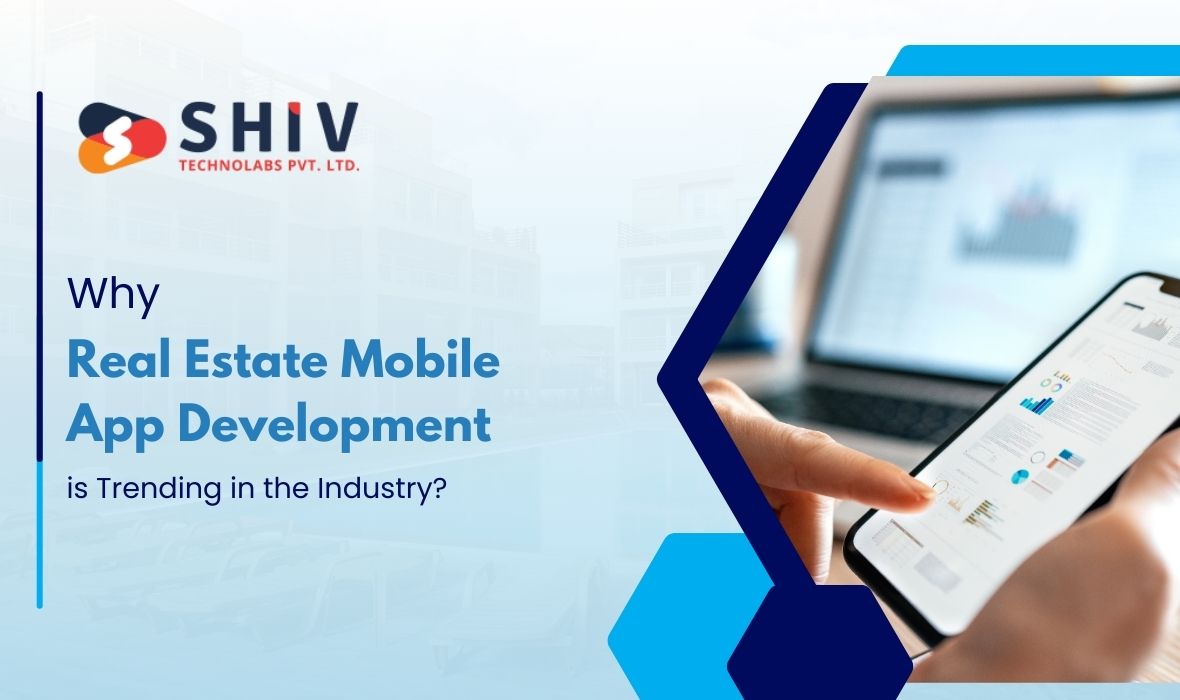Table of Contents
In the rapidly evolving digital age, mobile applications have become indispensable in almost every industry. The real estate sector, traditionally reliant on personal interactions and physical site visits, is now increasingly embracing mobile technology. This transition not only improves user experience but also optimizes operations and expands market reach. This comprehensive guide explores various aspects of real estate mobile app development, including costs, key features, development steps, and current trends.
Why Real Estate Mobile App Development is Trending in the Industry?

The surge in real estate mobile app development can be attributed to several factors:
- Convenience and Accessibility: Mobile apps offer unparalleled convenience, allowing users to browse properties, contact agents, and schedule viewings anytime, anywhere. This eliminates the need for physical presence, making the property search process seamless.
- Enhanced User Experience: Interactive features like virtual tours and augmented reality (AR) provide a more immersive experience for users. These technologies enable potential buyers to explore properties in detail without being there physically.
- Data-Driven Decisions: Apps equipped with analytics and data integration help users make informed decisions by providing real-time market data and trends. This data includes property prices, neighborhood insights, and historical sales data, which are crucial for buyers and investors.
- Cost-Effectiveness: Digital platforms reduce the need for physical visits and extensive paperwork, cutting down operational costs. Agents and brokers can manage listings and client interactions more efficiently through the app.
- Competitive Advantage: Real estate firms adopting mobile technology gain a competitive edge by offering modern, user-friendly services. Clients are more likely to engage with companies that provide a convenient and efficient way to search for properties.
Types of Mobile Apps for Real Estate
Real estate mobile apps can be categorized based on their functionalities and target users:
- Property Listing Apps: These apps list available properties for sale or rent, providing detailed descriptions, photos, and contact information. Examples include Zillow and Realtor.com.
- Agent/Broker Apps: Designed for real estate agents and brokers, these apps help manage listings, client interactions, and schedules. They often include CRM functionalities.
- Investment Apps: Focused on real estate investors, these apps offer market analysis, property investment tips, and portfolio management tools. Apps like Fundrise and Roofstock fall into this category.
- Rental Apps: These apps cater to rental properties, helping tenants find rentals and landlords manage their properties. Zillow Rentals and Rent.com are popular examples.
- Marketplace Apps: Combining multiple functionalities, these apps serve as a comprehensive platform for buying, selling, and renting properties. They often include additional services like mortgage calculators and neighborhood insights.
# Key Features of a Real Estate Mobile App

To meet user expectations and industry standards, a real estate mobile app should include the following key features:
- User Registration and Profile Management: Secure and easy registration process with options to create and manage profiles. Users should be able to save their preferences and favorite properties.
- Advanced Search and Filter Options: Allow users to search properties based on various criteria such as location, price range, property type, and amenities. Filters enhance the search experience by narrowing down the options.
- Property Listings with Details: Comprehensive property details including photos, videos, descriptions, and agent contact information. Listings should be regularly updated to provide accurate information.
- Interactive Maps: Integration with maps for location-based searches and property viewings. Users can explore the neighborhood and check the proximity to schools, hospitals, and other amenities.
- Virtual Tours and AR Integration: Provide virtual property tours and augmented reality features for a more engaging user experience. This allows users to visualize the property better.
- Favorites and Wishlist: Users can save their preferred properties for future reference. This feature helps users keep track of properties they are interested in.
- Push Notifications: Alerts for new listings, price drops, and other important updates. Notifications keep users informed about the latest developments.
- In-App Chat and Call Features: Facilitate direct communication between users and agents. This helps in quick query resolution and better customer service.
- Payment Integration: Secure payment gateways for transactions related to property bookings or purchases. Users should be able to make payments for booking fees or down payments through the app.
- Analytics and Reporting: Tools for agents and property owners to track user interactions, leads, and other metrics. This data can be used to improve services and marketing strategies.
Benefits of Mobile App Development for Real Estate
Developing a mobile app for the real estate sector offers numerous advantages:
- Wider Reach: Mobile apps extend the reach of real estate firms beyond local markets to a global audience. With the internet, properties can be showcased to potential buyers worldwide.
- Improved Efficiency: Streamlined processes reduce manual work, enabling faster transactions and better management of properties. Agents can manage their listings, schedule viewings, and communicate with clients through a single platform.
- Enhanced Customer Experience: Users benefit from a convenient, user-friendly platform that meets their real estate needs. The app can provide a personalized experience based on user preferences and search history.
- Increased Sales and Revenue: With features like virtual tours and real-time communication, mobile apps drive more sales and higher customer satisfaction. The ease of use and accessibility attract more users to the platform.
- Brand Building: A professional, well-designed app strengthens the brand image of a real estate firm. It shows that the company is keeping up with technological advancements and is committed to providing the best services to its clients.
Steps to Create a Real Estate Mobile App
Creating a real estate mobile app involves several crucial steps:
- Market Research and Planning: Understand the market demands, target audience, and competition to define the app’s purpose and features. Conduct surveys and interviews to gather insights from potential users.
- Define Features and Requirements: List all necessary features and create detailed specifications for the app. Prioritize features based on user needs and market trends.
- UI/UX Design: Design an intuitive and visually appealing user interface that offers a seamless user experience. Focus on ease of navigation and accessibility.
- Development: Choose the right technology stack and begin the development process, ensuring all features are implemented as planned. Agile methodology is often preferred for app development due to its flexibility and iterative approach.
- Testing: Perform thorough testing to identify and fix any bugs or issues. Test the app on different devices and operating systems to ensure compatibility.
- Launch: Deploy the app to the App Store and Google Play Store, and promote it to reach your target audience. Create a marketing plan to generate buzz around the launch.
- Maintenance and Updates: Regularly update the app with new features and improvements based on user feedback. Monitor the app’s performance and fix any issues promptly.
# Tech Stack Required for Real Estate App Development
The technology stack used for developing a real estate mobile app plays a crucial role in its performance and scalability. Here’s a typical tech stack:
- Frontend: React Native, Flutter, Swift (iOS), Kotlin (Android)
- Backend: Node.js, Laravel, Django
- Database: MongoDB, MySQL, PostgreSQL
- Cloud Services: AWS, Google Cloud, Microsoft Azure
- APIs: Google Maps API, payment gateway APIs (Stripe, PayPal), social media APIs
- DevOps: Docker, Kubernetes, Jenkins
# Cost of Developing a Real Estate Mobile App
The cost of developing a real estate mobile app can vary widely based on several factors:
- App Complexity: Basic apps with simple features are less expensive compared to complex apps with advanced functionalities like AR integration and virtual tours.
- Platform: Developing for both iOS and Android will cost more than focusing on a single platform.
- Design: Custom designs and animations add to the cost.
- Development Team: Hiring a skilled development team or partnering with an experienced agency influences the overall cost.
- Maintenance: Ongoing maintenance and updates should also be factored into the budget.
On average, a basic real estate mobile app might cost between $30,000 to $50,000, while more complex apps can range from $70,000 to $100,000 or more.
# Top Five Real Estate Mobile Applications in the Market
- Zillow: Known for its user-friendly interface and extensive property listings.
- Realtor.com: Offers accurate and up-to-date property information.
- Trulia: Features neighborhood insights and comprehensive property details.
- Redfin: Provides real-time data and a user-friendly interface.
- LoopNet: Specializes in commercial real estate listings.
How Shiv Technolabs Can Help You Develop Your Real Estate Mobile Application
Shiv Technolabs has a proven track record in developing robust and feature-rich mobile applications tailored to the real estate industry. Our team of experts ensures that your app is designed to meet market demands and provide an exceptional user experience. We offer:
- Customized Solutions: Tailored to meet your specific business needs.
- Expert Development Team: Skilled developers with experience in real estate app development.
- End-to-End Services: From initial planning and design to development, testing, and maintenance.
- Cutting-Edge Technology: Utilizing the latest technology stack for high performance and scalability.
- Ongoing Support: Continuous support and updates to keep your app running smoothly.
Contact Shiv Technolabs today to discuss your real estate mobile app development project and take the first step towards transforming your business.
Trends in Real Estate Mobile App Development
Keeping up with trends is crucial for the success of any mobile app, including those in the real estate sector. Here are some trends currently shaping real estate mobile app development:
- Artificial Intelligence (AI) and Machine Learning (ML): AI and ML are transforming real estate apps by providing personalized property recommendations, predictive analytics, and chatbots for customer support.
- Blockchain Technology: Blockchain can enhance the transparency and security of real estate transactions, ensuring that all records are immutable and tamper-proof.
- Internet of Things (IoT): IoT devices can be integrated with real estate apps to offer smart home features, such as remote control of home appliances, security systems, and energy management.
- Big Data Analytics: Big data helps in analyzing vast amounts of real estate data to provide insights into market trends, property values, and customer preferences.
- Voice Search: With the rise of voice-activated devices like Amazon Alexa and Google Home, integrating voice search functionality into real estate apps can improve user experience.
- Augmented Reality (AR) and Virtual Reality (VR): AR and VR technologies enable virtual property tours, giving users a realistic experience of the property without being physically present.
- Mobile Payment Integration: Seamless payment integration allows users to make secure transactions within the app, such as booking fees or down payments.
# Challenges in Real Estate Mobile App Development
Despite the numerous benefits, developing a real estate mobile app comes with its own set of challenges:
- Data Security: Ensuring the security of user data and transactions is paramount. Implementing robust security measures like encryption, secure payment gateways, and regular security audits is essential.
- Integration with Third-Party Services: Real estate apps often need to integrate with various third-party services like payment gateways, map services, and social media platforms. Ensuring smooth integration without compromising on performance can be challenging.
- User Adoption: Convincing users to adopt a new app can be difficult. Effective marketing strategies and providing a seamless user experience are key to gaining user trust and adoption.
- Regulatory Compliance: Real estate transactions are subject to various regulations and laws. Ensuring that the app complies with all relevant regulations is crucial to avoid legal issues.
- Maintenance and Updates: Regular maintenance and updates are necessary to keep the app running smoothly and to add new features based on user feedback and market trends. This requires a dedicated team and continuous investment.
Future of Real Estate Mobile Apps
The future of real estate mobile apps looks promising with advancements in technology and increasing adoption by users. Here are some predictions for the future:
- Increased Use of AI and ML: AI and ML will continue to play a significant role in enhancing the functionality of real estate apps. From personalized property recommendations to predictive analytics, these technologies will make apps smarter and more intuitive.
- Greater Adoption of AR and VR: AR and VR technologies will become more mainstream, offering users immersive experiences and virtual property tours. This will make the property search process more engaging and efficient.
- Blockchain for Secure Transactions: Blockchain technology will be increasingly used to secure real estate transactions, ensuring transparency and reducing the risk of fraud.
- Integration with Smart Home Technologies: Real estate apps will integrate more with smart home technologies, allowing users to control home appliances, security systems, and energy management through the app.
- Expansion to Emerging Markets: As mobile internet penetration increases in emerging markets, real estate apps will expand their reach, providing more opportunities for property buyers and sellers in these regions.
Conclusion
Developing a real estate mobile app is a strategic move that can offer numerous benefits to real estate firms, agents, and customers. By providing a convenient, efficient, and user-friendly platform, real estate apps can enhance customer experience, streamline operations, and drive sales. However, it is essential to stay updated with the latest trends and technologies to remain competitive in the market.
Shiv Technolabs offers comprehensive solutions for mobile app development in UAE, ensuring that your app meets market demands and provides an exceptional user experience. Contact us today to discuss your real estate mobile app development project and take the first step towards transforming your business.



















